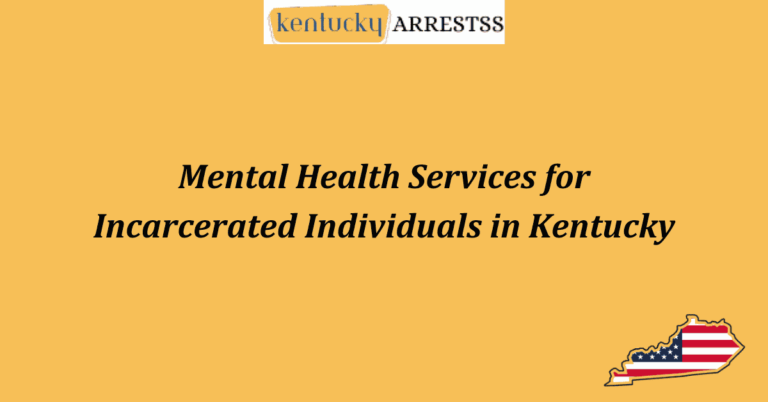Rehabilitation Services for Inmates in Kentucky
In Kentucky, inmates have access to essential rehabilitation services aimed at supporting their successful reintegration into society. These services encompass a wide range of programs focused on skill-building, counseling, and vocational training to equip individuals with the tools they need to lead productive lives post-incarceration.
Through personalized rehabilitation plans, inmates in Kentucky are provided with the opportunity to address underlying issues, learn new coping mechanisms, and acquire valuable skills that can pave the way for a brighter future. By investing in rehabilitation services for inmates, Kentucky aims to reduce recidivism rates and foster a sense of hope and empowerment among those seeking to turn their lives around.
Kentucky’s Vital Role: Inmate Rehabilitation Services
Rehabilitation services for inmates in Kentucky play a crucial role in helping individuals reintegrate into society after serving their time. These services aim to address the underlying issues that may have led to criminal behavior and provide inmates with the necessary skills and support to lead productive lives upon release.
Importance of Rehab Services for Inmates
Skills training, job placement, and life skills development are essential components of rehabilitation services for inmates in Kentucky. By focusing on these areas, inmates are better equipped to secure employment, maintain healthy relationships, and avoid reoffending.
Personalized Treatment Plans for Inmate Recovery
Each inmate requires a personalized treatment plan that addresses their specific needs and challenges. By tailoring rehabilitation programs to individual circumstances, inmates are more likely to experience successful reintegration into society.
Therapeutic Interventions in Inmate Rehabilitation
Therapeutic interventions, such as counseling and behavioral therapy, are key components of inmate rehabilitation. These interventions help inmates address underlying issues, develop coping strategies, and make positive changes in their lives.
Support Systems for Inmates’ Well-Being
Physical therapy, occupational therapy, and speech therapy are important support systems for inmates’ well-being. These therapies help inmates improve their physical health, develop essential life skills, and enhance their communication abilities.
Physical Therapy Benefits for Inmate Health
Physical therapy helps inmates improve their mobility, strength, and overall physical health. By addressing physical limitations and promoting wellness, inmates are better prepared to engage in daily activities and work responsibilities.
Occupational Therapy for Inmate Independence
Occupational therapy focuses on helping inmates develop the necessary skills to perform daily tasks independently. By enhancing inmates’ independence and self-reliance, occupational therapy plays a vital role in their successful reintegration into society.
Speech Therapy in Inmate Rehabilitation
Speech therapy assists inmates in improving their communication skills and overcoming speech-related challenges. By enhancing inmates’ ability to express themselves effectively, speech therapy promotes better interpersonal relationships and job opportunities.
Healthcare Professionals in Inmate Recovery
Specialized facilities and outpatient clinics provide essential healthcare services for inmates in Kentucky. These facilities offer medical care, mental health support, and addiction treatment to address inmates’ complex needs and promote their overall well-being.
Specialized Facilities for Inmate Rehabilitation
Specialized facilities cater to the unique needs of inmates, offering comprehensive rehabilitation programs and medical services. These facilities play a critical role in supporting inmates’ recovery and preparing them for a successful transition back into society.
Outpatient Clinics for Inmate Support
Outpatient clinics provide ongoing support and services to inmates as they transition from incarceration to community living. These clinics offer counseling, medication management, and follow-up care to ensure inmates receive the necessary support for their continued rehabilitation.
Frequently Asked Questions
Here you will find answers to commonly asked questions about Rehabilitation Services for Inmates in Kentucky.
What types of rehabilitation services are offered to inmates in Kentucky?
In Kentucky, inmates have access to a variety of rehabilitation services, including educational programs, vocational training, substance abuse treatment, mental health counseling, and reentry planning. These services are designed to help inmates address the root causes of their criminal behavior and prepare them for successful reintegration into society upon release.
Do rehab programs in Kentucky cut inmate reoffending?
Research has shown that participation in rehabilitation programs can significantly reduce recidivism rates among inmates in Kentucky. By addressing factors such as substance abuse, lack of education, and limited job skills, these programs help inmates develop the tools they need to lead productive, law-abiding lives after release.
Do all Kentucky inmates get rehab no matter their crime?
While most inmates in Kentucky have access to some form of rehabilitation services, the availability and type of programs may vary depending on the inmate’s offense, sentence length, and individual needs. Inmates classified as minimum security may have more opportunities for rehabilitation than those in maximum security facilities.
How are rehabilitation programs funded in Kentucky?
Rehabilitation programs for inmates in Kentucky are funded through a combination of state and federal resources, as well as grants and donations from private organizations. The Kentucky Department of Corrections allocates a portion of its budget to support these programs, recognizing the importance of rehabilitation in reducing recidivism and promoting public safety.
How do community groups help rehab inmates in Kentucky?
Community organizations play a crucial role in supporting rehabilitation services for inmates in Kentucky by providing additional resources, such as job training, housing assistance, and mentorship programs. These partnerships help bridge the gap between incarceration and reentry, offering inmates the support they need to successfully reintegrate into society.






